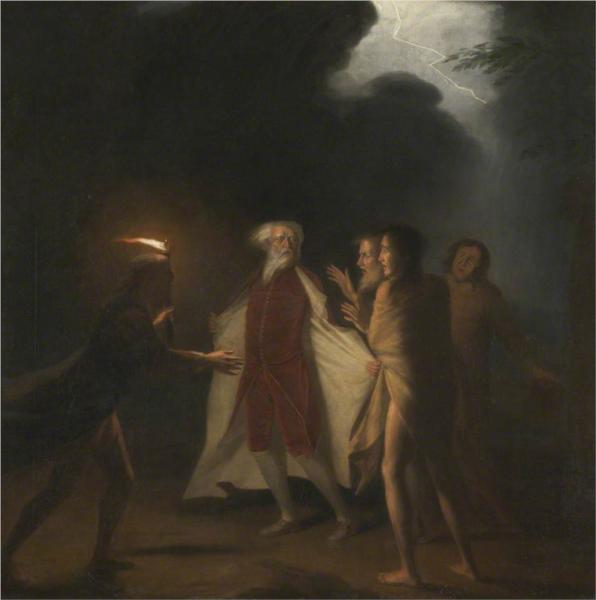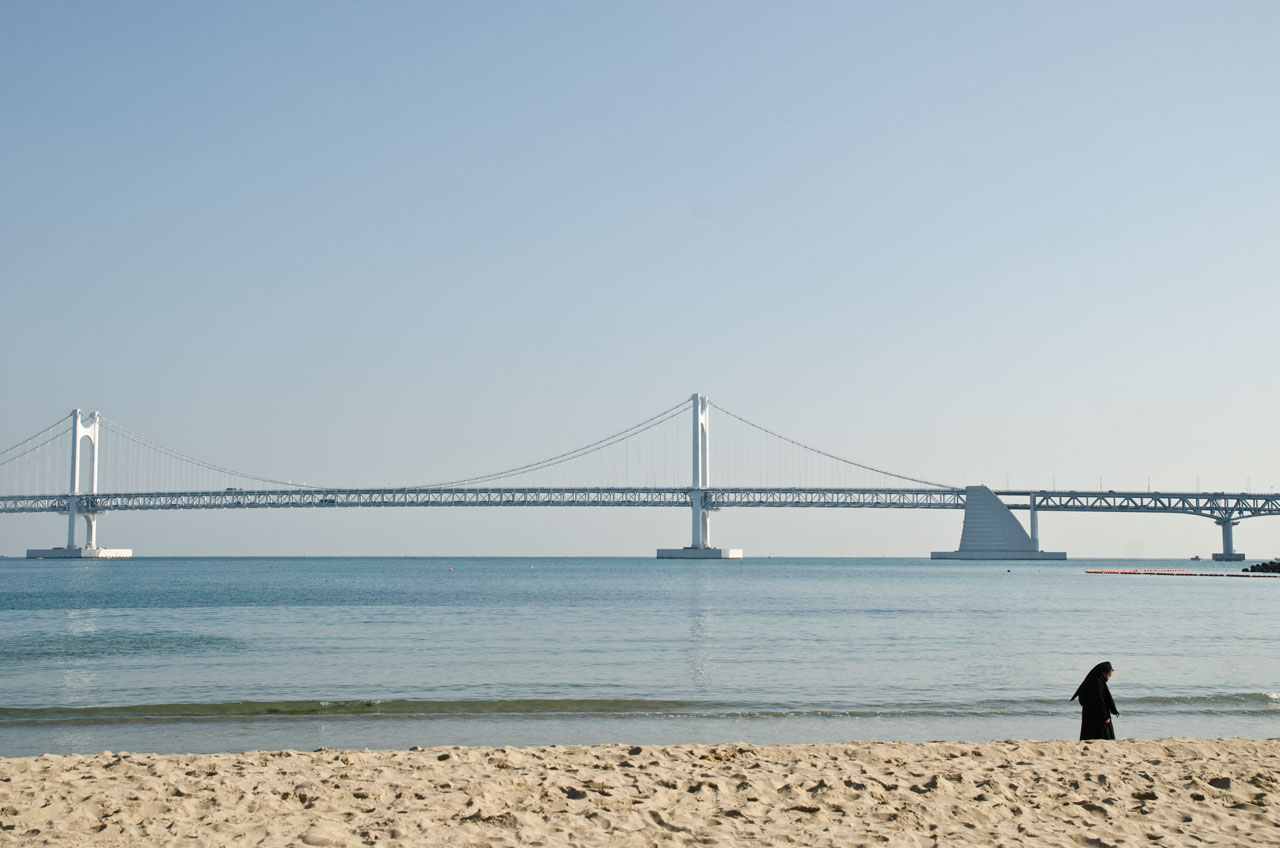
Category Archives: memoria

Farewell Speech
Watched Obama’s Farewell Speech:
Our Constitution is a remarkable, beautiful gift. But it’s really just a piece of parchment. It has no power on its own. We, the people, give it power – with our participation, and the choices we make. Whether or not we stand up for our freedoms. Whether or not we respect and enforce the rule of law. America is no fragile thing. But the gains of our long journey to freedom are not assured.
In his own farewell address, George Washington wrote that self-government is the underpinning of our safety, prosperity, and liberty, but “from different causes and from different quarters much pains will be taken…to weaken in your minds the conviction of this truth;” that we should preserve it with “jealous anxiety;” that we should reject “the first dawning of every attempt to alienate any portion of our country from the rest or to enfeeble the sacred ties” that make us one.
We weaken those ties when we allow our political dialogue to become so corrosive that people of good character are turned off from public service; so coarse with rancor that Americans with whom we disagree are not just misguided, but somehow malevolent. We weaken those ties when we define some of us as more American than others; when we write off the whole system as inevitably corrupt, and blame the leaders we elect without examining our own role in electing them.
It falls to each of us to be those anxious, jealous guardians of our democracy; to embrace the joyous task we’ve been given to continually try to improve this great nation of ours. Because for all our outward differences, we all share the same proud title: Citizen.
Ultimately, that’s what our democracy demands. It needs you. Not just when there’s an election, not just when your own narrow interest is at stake, but over the full span of a lifetime. If you’re tired of arguing with strangers on the internet, try to talk with one in real life. If something needs fixing, lace up your shoes and do some organizing. If you’re disappointed by your elected officials, grab a clipboard, get some signatures, and run for office yourself. Show up. Dive in. Persevere. Sometimes you’ll win. Sometimes you’ll lose. Presuming a reservoir of goodness in others can be a risk, and there will be times when the process disappoints you. But for those of us fortunate enough to have been a part of this work, to see it up close, let me tell you, it can energize and inspire. And more often than not, your faith in America – and in Americans – will be confirmed.
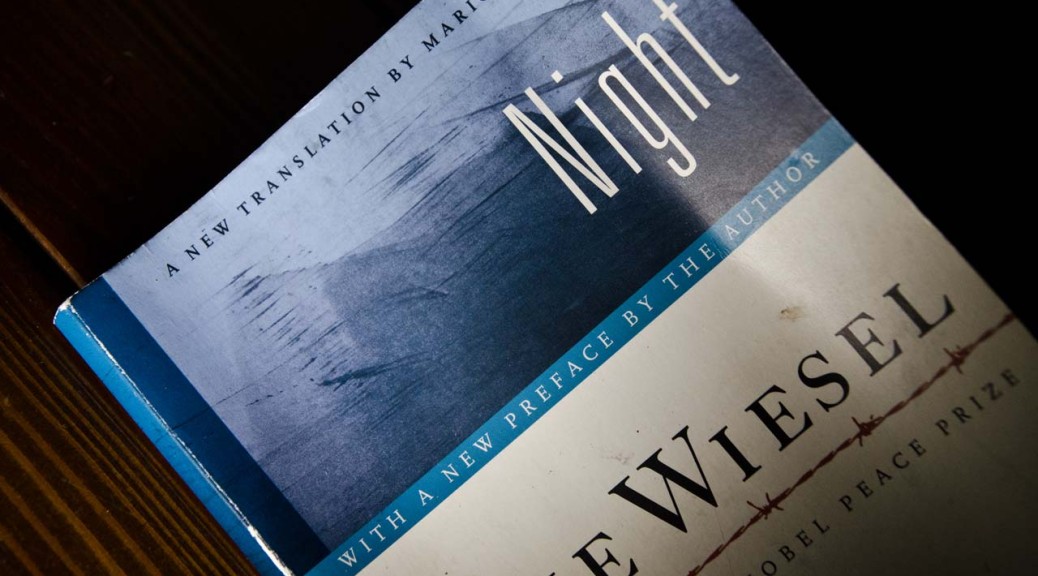
Night
Wiesel, Elie, and Marion Wiesel. Night. New York, NY: Hill and Wang, a Division of Farrar, Straus and Giroux, 2006. Print. (First Ed. 1958).
“Or the discovery of a demented and glacial universe where to be in-human was human, where disciplined, educated men in uniform came to kill, and innocent children and weary old men came to die?” p ix
שכינה Shekhinah
“We believed in God, trusted in man, and lived with the illusion that every one of us has been entrusted with a sacred spark from the Shekhinah’s flame; that every one of us carries in his eyes and in his soul a reflection of God’s image.” p. x-xi
“To forget would be not only dangerous but offensive; to forget the dead would be akin to killing them a second time.” p. xv
Moishe the Beadle “He spoke little. He sang, or rather he chanted, and the few snatches I caught here and there spoke of divine suffering, of the Shekhinah in Exile, where according to Kabbalah, it awaits its redemption linked to that of man.” p. 3
“One day I asked my father to find me a master who could guide me in my studies of Kabbalah. “You are too young for that. Maimonides tells us that one must be thirty before venturing into the world of mysticism, a world fraught with peril. First you must study the basic subjects, those you are able to comprehend.” p. 4

Moses Maimonides. Blaisio Ugolino. 1744. Via wikimedia.
Maimonides
Moishe “explained to me, with great emphasis, that every question possessed a power that was lost in the answer…” p. 4-5.
“Man comes closer to God thought the questions he asks Him, he liked to say. Therein lies true dialogue. Man asks and God replies. But we don’t understand His replies. We cannot understand them. Because they dwell in the depths of our souls and remain there until we die. The real answers, Eliezer, you will find only within yourself.” p. 5
“There are a thousand and one gates allowing entry into the orchard of mystical truth. Every human being has his own gate. He must not err and wish to enter the orchard through a gate other than his own.” p. 5
“In front of us, those flames. In the air, the smell of burning flesh. It must have been around midnight. We had arrived. In Birkenau.” p. 28
“I didn’t know this was the moment in time and the place where I was leaving my mother and Tzipora forever. I kept walking, my father holding my hand.” p. 29
“NEVER SHALL I FORGET that night, the first night in camp, that turned my life into one long night seven times sealed.
Never shall I forget that smoke.
Never shall I forget the small faces of the children whose bodies I saw transformed into smoke under a silent sky.
Never shall I forget those flames that consumed my faith forever.
Never shall I forget the nocturnal silence that deprived me for all eternity of the desire to live.
Never shall I forget those moments that murdered my God and my soul and turned my dreams to ashes.
Never shall I forget those things, even were I condemned to live as long as God Himself.
Never.” p. 34
“But no sooner had we taken a few more steps than we saw the barbed wire of another camp. This one had an iron gate with the overhead inscription: ARBEIT MACHT FREI. Work makes you free.
Auschwitz.” p. 40
“Have faith in life, a thousand times faith. By driving out despair, you will move away from death. Hell does not last forever…” p. 41
“But there were those who said we should fast, precisely because it was dangerous to do so. We needed to show God that even here, locked in hell, we were capable of singing His praises.” p. 69
“”Perhaps someone here has seen my son?”
He had lost his son in the commotion. He had searched for him among the dying, to no avail. Then he had dug through the snow to find his body. In vain.” p. 90
“”No, Rabbi Eliahu, I haven’t seen him.”
And so he left, as he had come: a shadow swept away by the wind.” p. 91
“A terrible thought crossed my mind: What if he had wanted to be rid of his father? He had felt his father growing weaker and, believing that the end was near, had thought by this separation to free himself of a burden that could diminish his own chance for survival… “Oh God, Master of the Universe, give me the strength never to do what Rabbi Eliahu’s son has done.” p. 91
“When at last a grayinsh light appeared on the horizon, it revealed a tangle of human shapes, heads sunk deeply between shoulders, crouching, piled one on top of the other, like a cemetery covered with snow. In the early dawn light, I tried to distinguish between the living and those who were no more. But there was barely a difference.” p. 98
“I gave him what was left of my soup. But my heart was heavy. I was aware that I was doing it grudgingly.
Just like Rabbi Eliahu’s son, I had not passed the test.” p. 107
“All of a sudden, he sat up and placed his feverish lips against my ear:
“Eliezer… I must tell you where I buried the gold and silver…In the cellar… You know…”” p. 108
“No prayers were said over his tomb. No candle lit in his memory. His last word had been my name. He had called out to me and I had not answered.” p. 112
“I had not seen myself since the ghetto.
From the depth of the mirror, a corpse was contemplating me.” p. 115
Nobel Peace Prize Acceptance Speech
“Because if we forget, we are guilty, we are accomplices.” p. 118
“We must take sides Neutrality helps the oppressor, never the victim. Silence encourages the tormentor, never the tormented. Sometimes we must interfere. When himan lives are endangered, when himan dignity is in jeopardy, national borders and sensitivities become irrelevant.” p. 118

안리

쵸콜리노 & 욜로
Suttree
Suttree influences
from books-and-movies-that-influenced-the-writing-of-suttree thread at http://www.cormacmccarthy.com
Davis Grubbs
George Washington Harris
Sut Lovingood: Yarns Spun By a Nat’ral Born Durn’d Fool
William Faulkner
Sutpen in Absalom, Absalom! and The Reivers
William Shakespeare
(characters liked by Faulkner) Falstaff, Prince Hal, Nick Bottom, Mercutio, Huck Finn, Jim

Falstaff at Herne’s Oak, from “The Merry Wives of Windsor,” Act V, Scene v, James Stephanoff, 1832. Via Wikimedia.

Scene from A Midsummer Night’s Dream (1848-1851). Titania and Bottom. Edwin Henry Landseer (1802–1873). Via Wikimedia.
Joseph Conrad
Dante Alighieri
James Joyce
Nelson Algren
The Neon Wilderness and A Walk on the Wild Side
Ralph Waldo Emerson
Walt Whitman
T.S. Eliot
W. B. Yeats
John Keats
Hermann Hesse
Mark Twain
Herman Melville
H. L. Mencken
(Henry Louis Mencken) See The Philosophy of Friedrich Nietzsche (1907)
Scopes Trial (1925)
The State of Tennessee v. John Thomas Scopes/The Scopes Monkey Trial and Tennessee’s Butler Act. (On human evolution)

Four Rivers
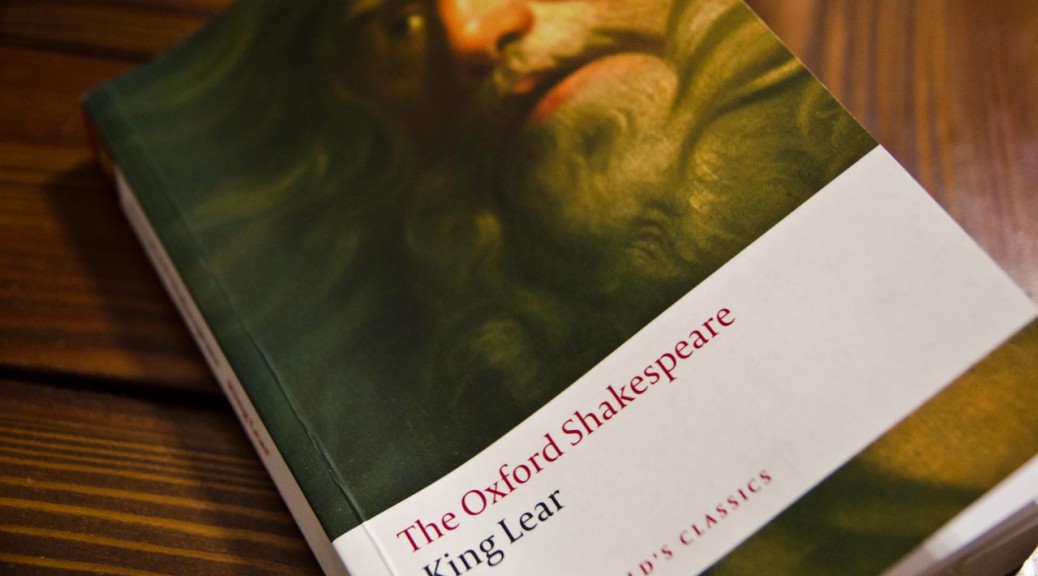
King Lear (I)
Shakespeare, William, and Stanley Wells. The History of King Lear. Oxford: Oxford UP, 2008. Print.
To read:
Prometheus Vinctus by Aeschylus

Dirck van Baburen – Prometheus Being Chained by Vulcan. circa 1594/1595–1624). Via Wikimedia.
Introduction by Stanley Wells
“The folio is, after all, a derivative, adapted, and edited text.” p. 8
“Muir, however, notes eclipses of both sun and moon in 1601 ‘that would still be remembered by the audience’, and there was a partial eclipse of the moon in May 1603.” p. 12
“Titus Andronicus he had already portrayed an elderly tyrant who goes mad” p. 14
To Read:
The Theme of the Three Caskets by Sigmund Freud
“proposes that the opening scene is based on an ancient myth of a man’s having to choose among three women, the third one represents death. footnote p. 16
Historia regum Britanniae
“written by the learned and imaginative monk Geoffrey of Monmouth” p. 17

Illumination of a 15th century manuscript of Historia Regum Britanniae showing king of the Britons Vortigern and Ambros watching the fight between two dragons. Via Wikimedia.
“Gonorilla to the Duke of Cornwall, Regan to the Duke of Albania, or Albany, the northern part of Britain. Later Aganipus, King of the Franks, married the dowerless Cordeilla for love.” p. 17

Cordelia. 1888. William Frederick Yeames (1835–1918). Via Wikimedia.

Edwin Austin Abbey (1852–1911) King Lear, Cordelia’s Farewell. Metropolitan Museum of Art – New York, NY . Via Wikimedia.
“Aganippus raised an army to restore him to his kingdom; they succeeded, and three years later Lear died. (By this time he must have been very old indeed.) Cordeilla, widowed, buried her father at Leicester. Some years later her nephews rebelled against her, captured her, and put her in prison, where she committed suicide.” p. 17
to read:
Arcadia by Sir Philip Sidney
“In reading it, Shakespeare must have been struck by the relation between the Lear story and the episodes in Arcadia telling of a Paphlagonian king deposed and blinded by a wicked, illegitimate son but cherished by the natural son whom, under the influence of the bastard, he has cast off with orders-not obeyed-that he be killed.” p. 26
“Shakespeare is indebted to Arcadia for plot motifs and atmospheric effects rather than for language.” p. 26
“The Bible exerted a strong influence, even though Shakespeare has been at pains to locate his action in a non-Christian, pagan society; indeed, both the Book of Job and the parable of the Prodigal Son have been regarded as deep sources of the play.” p. 29
George Orwell essay: Lear, Tolstoy and the Fool.” p. 32
Tolstoy on Shakespeare wikipedia article
Tolstoy on Shakespeare; a critical essay on Shakespeare
“It might on the contrary be argued that Shakespeare’s opening scene is a masterpiece of dramatic exposition-almost a little play in its own right-and that its reduction and simplification of motive is one of the ways in which it establishes a mode in which symbol and emblem will have as important a part to play as psychological verisimilitude.” p. 33
Michael Gambon playing the Fool “That weekend I hurried to London Zoo to watch the chimps and became even more convinced that they had all the requisite qualities for the Fool-manic comic energy when in action, a disturbing sadness when in repose.” p. 42
“But the suffering diminishes when madness comes upon him. As Gloucester is to realize later in the play, madness can bring relief from suffering.” p. 45
footnote Howard Felperin “takes a contrary view: Gloucester ‘naïvely wishes he could go made like Lear, mistaking madness for a protection against pain when it is in fact an exposure to it.” p. 45
“Suffering teaches both men how they have misvalued their offspring, and leads them to acknowledge their own faults and to express humility.” p. 46

José Ribera, Ixion (1632). Oil on canvas, 220 x 301 cm. Museo del Prado, Madrid. Via Wikimedia.
See Ixion
literary context of ‘bound upon a wheel of fire‘ p.47
“The Wheel of Fire is part of the Aristotelian reading of a tragedy (e.g. plays), which includes the central flaw within a character.” wikipedia
“To its early audiences, the language of King Lear must have seemed very strange, as original in its day as that of James Joyce or Dylan Thomas in theirs.” p. 53
To read:
Dylan Thomas
poems: Do not go gentle into that good night, and And death shall have no dominion.
Margreta de Grazia “the play itself goes to extremes, pushing beyond the bounds of tragedy, particularly in its superfluous addition of Cordelia’s death.” p. 53
“What Tate did to Shakespeare was not essentially different from what Shakespeare had done to King Leir: Shakespeare had turned an old tragicomedy into a tragedy, Tate reversed the process. In doing do created a new, different play which, critics have increasingly argued, has its own artistic validity.” p. 62
King Leir play
Nahum Tate‘s King Lear adaptation
“But at the time Tate wrote, Shakespeare was not thought of as an immortal classic, but as a dramatist whose works, however admirable, required adaptation to fit them for the new theatrical and social circumstances of the time, as well as to changes in taste.” p. 62
Tate’s play “supplanted Shakespeare’s play in every performance given from 1681 to 1838.” p. 63
See John Runciman (1744-68), King Lear in the Storm (1767)
See Alexander Runciman (1736-85) King Lear on the Heath (1767)
“Barker insists that the storm is not in itself ‘dramatically important, only in its effect upon Lear’, and that the actor should ‘impersonate both Lear and-reflected in Lear-the storm’.” p. 72
King Lear (1970) Grigori Kozintsev
The Tale of Lear (1984) Tadashi Suzuki
King Lear (1987) Jean-Luc Godard
King Lear (1971) Peter Brook
King Lear (1983) Michael Elliott
A king Lear of the Steppes (1870) Turgenev
King Lear’s Wife (1915/1920) Gordon Bottomley
Lear (1971) Edward Bond
Book: A Thousand Acres (1991) Jane Smiley
“The language of Shakespeare’s time was permeated by the Bible.” p. 87
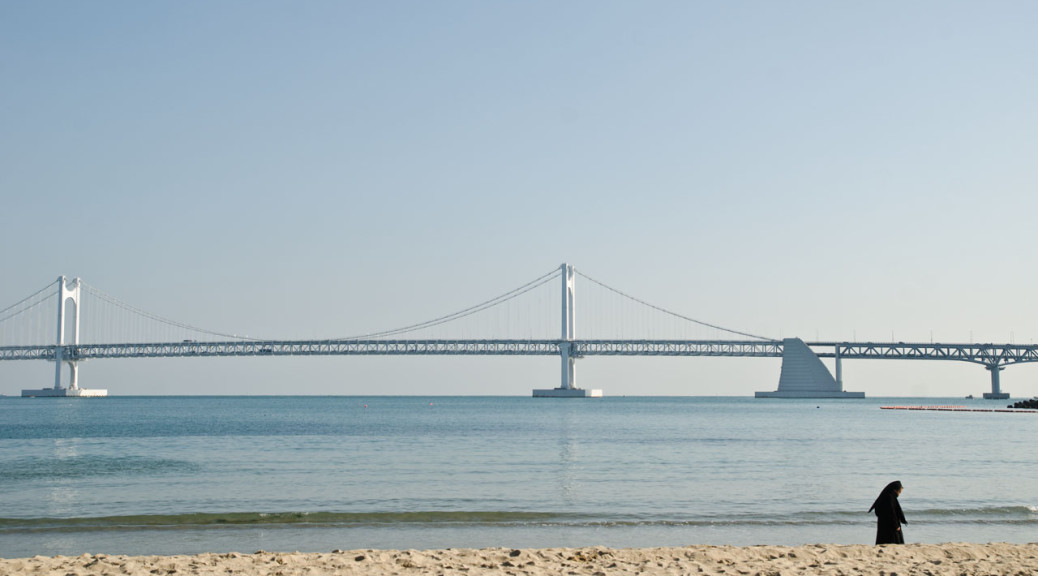
Nun at the beach




